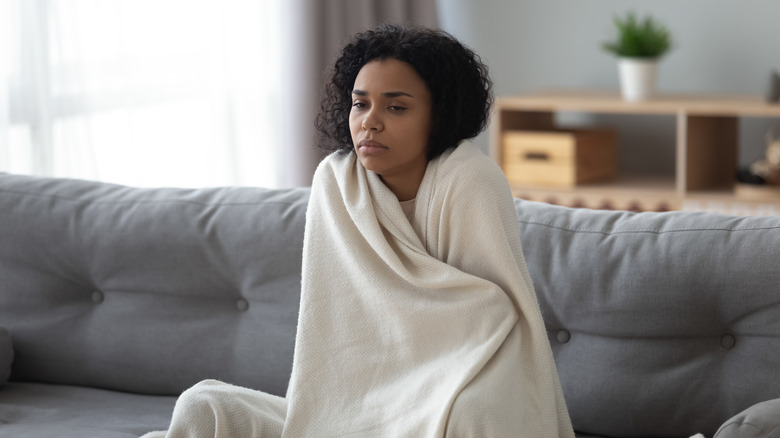Why Are You More Sensitive To The Cold When Lonely?
Loneliness has been referred to as an epidemic that can lead to an array of negative health effects, reports UChicagoMedicine. When someone experiences loneliness, they are in a state of mind in which they feel disconnected from other people. In contrast, someone can be alone but be happy spending time alone and therefore not experience loneliness. In the United States, as many as a third of people experience loneliness, and one in 12 people are significantly impacted by its detrimental effects. Severe health effects of loneliness include an increased risk of developing heart disease, inflammation, depression, and an estimated 26% increased risk of dying prematurely.
However, a more subtle symptom of loneliness is increased sensitivity to cold. If you find yourself shivering or getting chills while you're by yourself, this can indicate a lack of connection with others or a feeling like you don't belong.
You've probably heard the metaphor "give someone the cold shoulder" which means that one person is treating someone else in an unfriendly manner or intentionally ignoring them, as defined by the Cambridge Dictionary. But did you know that experiencing loneliness or feelings of exclusion can literally lead to the isolated person feeling chillier? Experts have made surprising discoveries to explain why a person may be more likely to shiver or feel sensitive to cold when lacking social connection (per Headspace).
How being lonely is linked to cold sensitivity
You don't have to endure chronic loneliness to experience the side effects of being lonely. Being excluded from a group, even temporarily, is enough to lower your body temperature, as found in a 2012 study published in Acta Psychologica. Researchers observed the body temperatures of participants during an online group ball-tossing game in which some participants were intentionally excluded. For the participants who were excluded, their respective body temperatures dropped an average of 0.378 degrees Celsius in comparison with the participants who were actively included in the group. The study determined that even exclusion from a group of strangers is enough to create the side effects of loneliness, such as decreased body temperature, and that being made to feel ostracized can make someone perceive a space as physically colder than peers who feel included.
Similarly, researchers from the University of Toronto set out to examine how social exclusion affects the perception of room temperature in a 2008 study published in Psychological Science. When participants recalled instances where they felt excluded, the researchers found that they tended to describe room temperatures as colder. On the other hand, participants who recalled times when they were included gave warmer estimates of room temperatures. It was concluded that there is a psychological experience of coldness when a person feels socially excluded, meaning that there is a very real scientific explanation to why you may shiver when feeling lonely.


